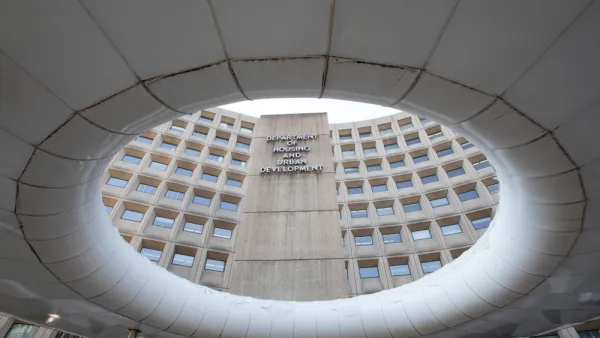A new rule proposed by the U.S. Department of Housing and Urban Development raises the burden of proof in cases of disparate impact, and provides additional defenses for defendants.

The U.S. Department of Housing and Urban Development published a new rule [pdf] regarding the disparate impact standards of the Fair Housing Act, following through on promises that date back to earlier times in the administration.
The news of the proposed rule, published on the Federal Register this Monday, was first reported by Katy O'Donnell for Politico at the end of July. Additional analysis by Lola Fadulu followed for the New York Times.
The day before the rule was published, Kriston Capps details the substance of the proposed rule for CityLab.
"The proposed regulation from the U.S. Department of Housing and Urban Development would replace an Obama-era rule on disparate impact, a legal theory that has guided fair housing law for more than 50 years," writes Capps.
The new rule "would substantially raise the burden of proof for parties claiming discrimination" and also "[carve] out an unprecedented guidance for the automated decision-making systems that power the housing market. "
The article by Capps includes more details on how the new rule would change the proceedings in disparate impact cases, both on the part of plaintiffs and defendants.
As noted by Capps, the new rule is the first federal regulation "to directly address algorithms and disparate impact." That component of the new rule is the subject of more analysis written this week by Emily Badger for the New York Times.
According to Badger's article, the disparate impact controversy applies to more examples than housing: "Industry groups and conservative legal advocates have long warned that any landlord, company or city official could be accused of discrimination simply if data shows racial patterns that exist for reasons beyond their control."
"If disparate impact becomes a less viable legal tool, civil rights groups counter that it will be almost impossible to curb policies and decisions that reinforce segregation and widen the racial wealth gap. If plaintiffs must prove that someone, somewhere, explicitly intended to discriminate, they’ll never be able to police city officials who keep that intent silent — or algorithms that have no 'intent' at all," adds Badger to present the reasons why fair housing advocates are concerned about the proposed rule.
The new rule entered a 60-day comment period when it was published on Monday.
FULL STORY: How HUD Could Dismantle a Pillar of Civil Rights Law

National Parks Layoffs Will Cause Communities to Lose Billions
Thousands of essential park workers were laid off this week, just before the busy spring break season.

Retro-silient?: America’s First “Eco-burb,” The Woodlands Turns 50
A master-planned community north of Houston offers lessons on green infrastructure and resilient design, but falls short of its founder’s lofty affordability and walkability goals.

Delivering for America Plan Will Downgrade Mail Service in at Least 49.5 Percent of Zip Codes
Republican and Democrat lawmakers criticize the plan for its disproportionate negative impact on rural communities.

Test News Post 1
This is a summary

Test News Headline 46
Test for the image on the front page.

Balancing Bombs and Butterflies: How the National Guard Protects a Rare Species
The National Guard at Fort Indiantown Gap uses GIS technology and land management strategies to balance military training with conservation efforts, ensuring the survival of the rare eastern regal fritillary butterfly.
Urban Design for Planners 1: Software Tools
This six-course series explores essential urban design concepts using open source software and equips planners with the tools they need to participate fully in the urban design process.
Planning for Universal Design
Learn the tools for implementing Universal Design in planning regulations.
EMC Planning Group, Inc.
Planetizen
Planetizen
Mpact (formerly Rail~Volution)
Great Falls Development Authority, Inc.
HUDs Office of Policy Development and Research
NYU Wagner Graduate School of Public Service





























